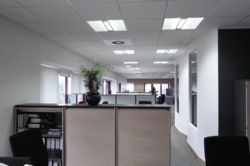National Audit Commission plugs into lighting energy savings

The National Audit Commission is realising energy and cost savings of its own thanks to the installation of Hager’s Klik DCS digital lighting control system in several of its offices.
Refurbishment of the lighting systems in several offices of the National Audit Commission using digital lighting control is achieving energy savings by controlling lighting according to occupancy and daylight availability. Contractor SES Electrical has completed the first three phases of work at the Audit Commission’s Bristol offices and also installed the system in its regional offices at Bolton and Solihull. The projects are based on Hager’s Klik DCS digital lighting system. The specification required local control in response to occupancy and daylight, with light levels set at 360 lx at desktop height. There is also a setback facility where the lights are dimmed to 200 lx after 30 minutes if no movement is detected; they turn off after a further period of time. These lighting schemes are designed to meet CIBSE LG3 guidelines. They address the both energy saving through local control and user comfort by avoiding the ‘cave effect’ of people working late being surrounded by darkness. For the Bristol offices, each phase had to be refurbished in just eight weeks while the staff moved into adjacent buildings. The work involved replacing the entire lighting system as well as power and data cabling and air-conditioning. The installation time savings of Klik plug-and-play technology can give installation time savings of up to 50%. Tel. 01952 677899
Related articles:


